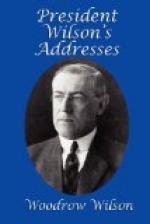Understand me, gentlemen, I am not venturing in this presence to impeach the law. For the present, by the force of circumstances, I am in part the embodiment of the law, and it would be very awkward to disavow myself. But I do wish to make this intimation, that in this time of world change, in this time when we are going to find out just how, in what particulars, and to what extent the real facts of human life and the real moral judgments of mankind prevail, it is worth while looking inside our municipal law and seeing whether the judgments of the law are made square with the moral judgments of mankind. For I believe that we are custodians, not of commands, but of a spirit. We are custodians of the spirit of righteousness, of the spirit of equal-handed justice, of the spirit of hope which believes in the perfectibility of the law with the perfectibility of human life itself.
Public life, like private life, would be very dull and dry if it were not for this belief in the essential beauty of the human spirit and the belief that the human spirit could be translated into action and into ordinance. Not entire. You cannot go any faster than you can advance the average moral judgments of the mass, but you can go at least as fast as that, and you can see to it that you do not lag behind the average moral judgments of the mass. I have in my life dealt with all sorts and conditions of men, and I have found that the flame of moral judgment burned just as bright in the man of humble life and limited experience as in the scholar and the man of affairs. And I would like his voice always to be heard, not as a witness, not as speaking in his own case, but as if he were the voice of men in general, in our courts of justice, as well as the voice of the lawyers, remembering what the law has been. My hope is that, being stirred to the depths by the extraordinary circumstances of the time in which we live, we may recover from those depths something of a renewal of that vision of the law with which men may be supposed to have started out in the old days of the oracles, who communed with the intimations of divinity.
THE POWER OF CHRISTIAN YOUNG MEN
[Address at the Young Men’s Christian Association’s Celebration, Pittsburgh, October 24, 1914.]
MR. PRESIDENT, MR. PORTER, LADIES AND GENTLEMEN:
I feel almost as if I were a truant, being away from Washington to-day, but I thought that perhaps if I were absent the Congress would have the more leisure to adjourn. I do not ordinarily open my office at Washington on Saturday. Being a schoolmaster, I am accustomed to a Saturday holiday, and I thought I could not better spend a holiday than by showing at least something of the true direction of my affections; for by long association with the men who have worked for this organization I can say that it has enlisted my deep affection.




